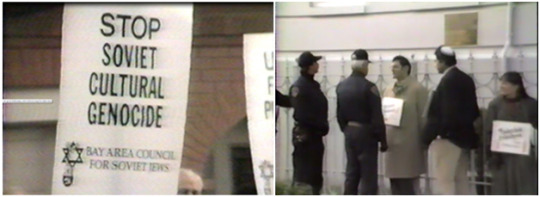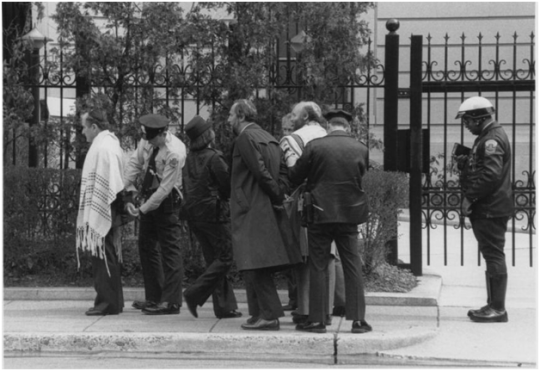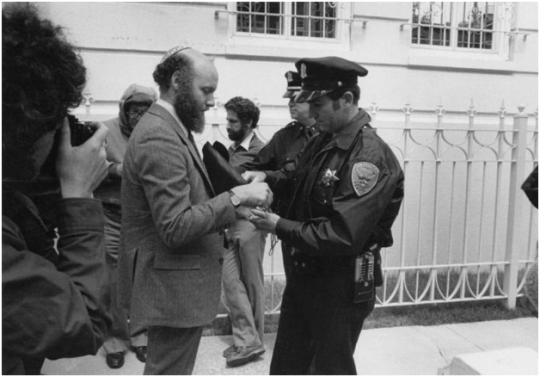By Andrey Filimonov, Archival Services Manager at
the Center for Jewish History

Screenshots from “Civil Disobedience—Demonstration and Clergy Arrest
at Soviet Consulate, November 18, 1985.” Original archival material found in
the Records
of the Bay Area Council for Soviet Jews and Bay Area Council for Jewish Rescue
and Renewal, I-505; box 100; VHS tape 69; American Jewish Historical Society, New York, NY;
http://digital.cjh.org/4633168
One of the VHS tapes in the American Jewish Historical
Society’s (AJHS) Archive of the American Soviet Jewry Movement,
recently digitized at the Center for Jewish History with a grant from the Blavatnik Family
Foundation, documents a protest rally in front of the Soviet Consulate
in San Francisco on November 18, 1985. The footage shows a group of over 20 rabbis
from the Bay Area, wearing placards with the names of Soviet Jewish Prisoners
of Conscience—including Ida Nudel, the subject of a previous post
on the 16th Street Blog—chaining themselves to the consulate’s fence
to protest the oppression of Jews in the USSR. The camera follows the group of
rabbis as they are approached by the police, asked to leave, refuse to do so,
are arrested and led away by the police officers.
Picketing of
the Soviet consulates in San Francisco, Washington, D.C., and New York was a
frequently-used tactic of American Soviet Jewry movement activists during the
1970s and 1980s as one of the very few ways to directly approach
representatives of the Soviet government and to raise public awareness of the
state-sanctioned oppression of Jews in the USSR. Some of the most vocal
participants in such demonstration were religious leaders, who would often
deliberately get themselves arrested by the police to amplify their message.

“National rabbinic leaders being arrested for
demonstrating in front of the Soviet Embassy in Washington, DC,
March 27, 1986.” Original archival material found in the American Soviet Jewry Movement Photographs
I-495; box
1; folder 4; photo 060; American Jewish Historical Society, New York, NY; http://digital.cjh.org/409476
The American
Jewish Historical Society holds the papers of Rabbi Leonard Cahan, an American Soviet Jewry Movement
activist who deliberately planned his own arrest and jail sentence for
demonstrating on behalf of Soviet Jews in front of the Soviet embassy in
Washington, D.C., on May 1, 1985.
Rabbi Cahan
of Congregation Har Shalom in Potomac, Maryland, served as president of the
Washington Board of Rabbis, which sponsored many demonstrations aimed to raise
public awareness of Soviet Jewry’s plight. During one such event on May 1, 1985,
Cahan, with a group of over 20 rabbis and a Lutheran minister, was arrested by the
Washington, D.C., police for violating the city code by demonstrating within
500 feet of the embassy and ignoring police warnings to disperse. Rabbi Cahan was
among the eight rabbis sentenced to six months probation, a $50 fine, and a
suspended jail term. Five of the rabbis, including Cahan, Steven Bayar, Bruce
Khan, David Oler and Mark Levine chose to serve their 15-day sentences in jail,
to show solidarity with the Jews in the USSR, oppressed by the Soviet
government. The rabbis were released after spending 12 days in the Federal
Correctional Institute in Petersburg, Virginia.
The
collection contains letters and telegrams of support from Jewish organizations
and individuals to Rabbi Cahan, materials of the Washington Board of Rabbis,
brochures with prison rules and regulations received by Cahan during his prison
term, paperwork regarding his admission and service at the prison camp, and local
and national press coverage of his case.

“Rabbinic Action for Soviet Jewry
demonstration in front of the Soviet Consulate in San Francisco; May 1, 1985.” Original archival material
found in
the American Soviet Jewry Movement Photographs
I-495;
box 1; folder 4; photo 056; American Jewish Historical Society, New York, NY; http://digital.cjh.org/409468
A previous 16th Street Blog posts, entitled “We must do our
share in the community of mankind”—the voice of Bayard Rustin in the American
Soviet Jewry movement, provides examples of non-Jewish civil rights
activists participating in the American Soviet Jewry movement. Similarly, the
religious leaders who chose to engage in acts of civil disobedience on behalf
of Soviet Jews were not exclusively Jewish. An example of this is well-documented
in another AASJM collection at the American Jewish Historical Society, the papers of an ordained Lutheran minister, Reverend
John Frederick Steinbruck (1930-2015).
Rev. Steinbruck served for 28 years as the senior pastor of
Luther Place Memorial Church (Memorial Evangelical Lutheran Church) in
Washington, D.C., and became well known for his work confronting the effects of
racism, discrimination, homelessness, economic inequality, and other social
injustices. Rev. Steinbruck was a firm believer in interfaith solidarity. In
1968, he co-founded a Protestant-Jewish-Catholic interfaith coalition
“Project of Easton,” to cooperate in solving social problems of each
community. The coalition marked the beginning of Rev. Steinbruck’s life-long
partnership with the Jewish community and involvement in Jewish causes,
including that of the Soviet Jewry. In the 1970s, at the initiative of Rev.
Steinbruck, the Luther Place Memorial Church adopted several Soviet Jewish
Prisoners of Conscience and managed to expedite the release of one of them and to
negotiate for improved conditions for the others. On two occasions, in 1980 and
1985, Rev. Steinbruck visited Refuseniks in various regions of the Former Soviet
Union. He was detained upon arrival in the Moscow airport and later harassed by
the KGB for attempting to deliver materials on Judaism and Hebrew and other
gifts to the Refuseniks trapped in the USSR. From 1970 until 1990, Rev.
Steinbruck and his congregants participated in the Soviet Jewry Vigil, a daily
demonstration across the street from the Soviet embassy in Washington, D.C.,
protesting the treatment of Soviet Jews. In the 1980s, Rev. Steinbruck was
repeatedly arrested for demonstrating on behalf of Soviet Jewry in front of the
Soviet embassy in Washington, D.C. One of the arrests resulted in a 15-day
suspended jail term.

